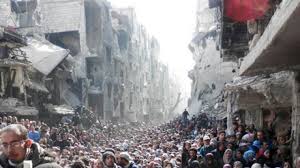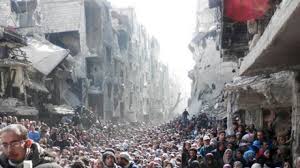
The United Nations humanitarian chief said that with more than 20 million people in four countries facing starvation and famine, the world faces the largest humanitarian crisis since the United Nations was founded in 1945.
"Without collective and coordinated global efforts, people will simply starve to death" and "many more will suffer and die from disease," Stephen O'Brien told the U.N. Security Council.
He urged safe and unimpeded access for humanitarian aid "to avert a catastrophe" and an immediate injection of funds for Yemen, South Sudan, Somalia and northeast Nigeria.
"To be precise," O'Brien said, "we need $4.4 billion by July."
Gains in economic development will be reversed and "livelihoods, futures and hope will be lost, children won't be able to go to school and will be stunted by severe malnutrition without a major infusion of money, he said.
When mortality rates are two or more deaths per 10,000 people every day, among other criteria and when more than 30 percent of children under age 5 suffer from acute malnutrition, a situation is defined as famine by U.N. and food organizations.
"Already at the beginning of the year we are facing the largest humanitarian crisis since the creation of the United Nations," O'Brien said. "Now, more than 20 million people across four countries face starvation and famine."
Yemen needs aid and more than seven million people are hungry and don't know where their next meal will come from the country faces the largest humanitarian crisis, O'Brien said. "That is three million people more than in January," he said.
O'Brien said more than 48,000 people fled fighting just in the past two months as the Arab world's poorest nation is engulfed in conflict.
Promises of access of aid were given when he met senior leaders of the government and the Shiite Houthi rebels who control the capital Sanaa during his recent visit to Yemen, O'Brien said.
"Yet all parties to the conflict are arbitrarily denying sustained humanitarian access and politicize aid," he said, warning if that behavior doesn't change now "they must be held accountable for the inevitable famine, unnecessary deaths and associated amplification in suffering that will follow."
While only 6 percent has been received so far, 12 million Yemenis "with life-saving assistance and protection" ne dot have access to $2.1 billion in aid for 2017, O'Brien said. A pledging conference for Yemen on April 25 in Geneva would be chaired by Secretary-General Antonio Guterres, he announced.
The U.N. humanitarian chief said that in South Sudan "the situation is worse than it has ever been.” Sudan is the world's newest nation which has been ravaged by a three-year civil war.
"The famine in South Sudan is man-made," he said. "Parties to the conflict are parties to the famine — as are those not intervening to make the violence stop."
About 3.4 million South Sudanese are displaced by fighting including almost 200,000 who have fled the country since January and more than 7.5 million people need aid, up by 1.4 million from last year, O'Brien said.
"More than one million children are estimated to be acutely malnourished across the country, including 270,000 children who face the imminent risk of death should they not be reached in time with assistance," he said. "Meanwhile, the cholera outbreak that began in June 2016 has spread to more locations."
"To be clear, we can avert a famine," O'Brien said. "We're ready despite incredible risk and danger ... but we need those huge funds now."
(Source:ww.blomberg.com)
"Without collective and coordinated global efforts, people will simply starve to death" and "many more will suffer and die from disease," Stephen O'Brien told the U.N. Security Council.
He urged safe and unimpeded access for humanitarian aid "to avert a catastrophe" and an immediate injection of funds for Yemen, South Sudan, Somalia and northeast Nigeria.
"To be precise," O'Brien said, "we need $4.4 billion by July."
Gains in economic development will be reversed and "livelihoods, futures and hope will be lost, children won't be able to go to school and will be stunted by severe malnutrition without a major infusion of money, he said.
When mortality rates are two or more deaths per 10,000 people every day, among other criteria and when more than 30 percent of children under age 5 suffer from acute malnutrition, a situation is defined as famine by U.N. and food organizations.
"Already at the beginning of the year we are facing the largest humanitarian crisis since the creation of the United Nations," O'Brien said. "Now, more than 20 million people across four countries face starvation and famine."
Yemen needs aid and more than seven million people are hungry and don't know where their next meal will come from the country faces the largest humanitarian crisis, O'Brien said. "That is three million people more than in January," he said.
O'Brien said more than 48,000 people fled fighting just in the past two months as the Arab world's poorest nation is engulfed in conflict.
Promises of access of aid were given when he met senior leaders of the government and the Shiite Houthi rebels who control the capital Sanaa during his recent visit to Yemen, O'Brien said.
"Yet all parties to the conflict are arbitrarily denying sustained humanitarian access and politicize aid," he said, warning if that behavior doesn't change now "they must be held accountable for the inevitable famine, unnecessary deaths and associated amplification in suffering that will follow."
While only 6 percent has been received so far, 12 million Yemenis "with life-saving assistance and protection" ne dot have access to $2.1 billion in aid for 2017, O'Brien said. A pledging conference for Yemen on April 25 in Geneva would be chaired by Secretary-General Antonio Guterres, he announced.
The U.N. humanitarian chief said that in South Sudan "the situation is worse than it has ever been.” Sudan is the world's newest nation which has been ravaged by a three-year civil war.
"The famine in South Sudan is man-made," he said. "Parties to the conflict are parties to the famine — as are those not intervening to make the violence stop."
About 3.4 million South Sudanese are displaced by fighting including almost 200,000 who have fled the country since January and more than 7.5 million people need aid, up by 1.4 million from last year, O'Brien said.
"More than one million children are estimated to be acutely malnourished across the country, including 270,000 children who face the imminent risk of death should they not be reached in time with assistance," he said. "Meanwhile, the cholera outbreak that began in June 2016 has spread to more locations."
"To be clear, we can avert a famine," O'Brien said. "We're ready despite incredible risk and danger ... but we need those huge funds now."
(Source:ww.blomberg.com)





